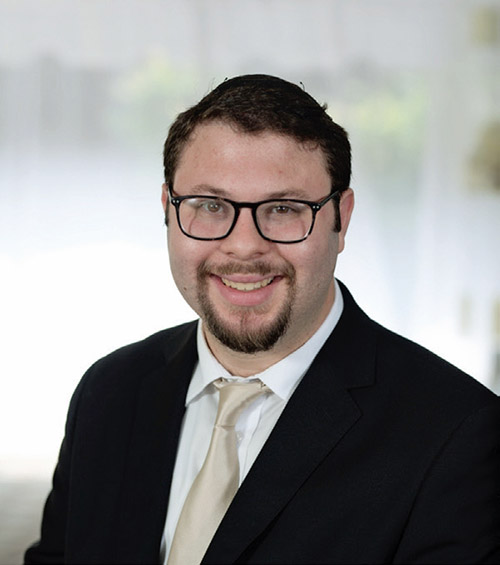
In July 2020, Rabbi Moshe Kurtz began serving as assistant rabbi of Stamford’s Congregation Agudath Sholom. After two years as rabbinic intern at Young Israel of Plainview, Rabbi Kurtz and his wife, Marisa, a speech-language pathologist, were looking for a long-term position in a community with strong Jewish infrastructure and a warm “out-of-town” experience. Stamford fit their wish list.
“I think it’s a very natural step when you come out of rabbinic
internship in a place like Plainview. I gave the Yizkor sermon on Yom Kippur in the main sanctuary; I performed a funeral when the rabbi was out of state,” explained Kurtz.
With his future goal of a full-time pulpit position, he sought an environment where he could build on his skills and serve the Jewish people while working under a seasoned rabbi, like Rabbi Daniel Cohen, who is well-known for pastoral care, organizational skills and cultivating Stamford’s big tent modern Orthodox community.
“While we are a modern Orthodox community observing Halacha very carefully, we are also very lucky and proud that many people who don’t identify as Orthodox attend our shul. It’s important to me to have a non-homogeneous shul but still a shul based on Halacha,” said Rabbi Kurtz.
His proba was scheduled for what became the first Shabbat of the COVID closure. They never had the opportunity to visit Stamford for Shabbat. Rabbi Kurtz had only visited Stamford once before with NCSY while in college, when he only saw the shul and its community layout.
Rabbi Kurtz continued, “Our interview was held in our little apartment in Queens. Marisa created a green screen with a background photo of the main sanctuary, back in the days before people understood Zoom’s virtual backgrounds. I had to explain that I wasn’t actually in their shul. Some members didn’t realize it was virtual. The fact we were able to adapt on a moment’s notice hopefully conveyed that we would be a good fit for the community.”
Knowing that the shul was building a new wing with a Beit Midrash, Rabbi Kurtz’s pre-COVID vision was to create a community Beit Midrash program. “We would have regular chavruta learning during the day for retirees, and in the evening for people who are working or for teenagers,” he explained. “We had a preliminary discussion with Rabbi Shimmy Trencher of Bi-Cultural Upper School of how we could collaborate to make sure the shul, school, adults and kids could work together. If the kids were learning a certain masechta of Gemara, I would have sessions with the parents to teach them the same material. That way, we would be creating a culture where we were all learning the same thing.”
The pandemic, however, led to a different vision. “I am personally passionate about kavod ha’tzibur. I believe in making sure davening doesn’t take a long time to a point where it is unnecessary and imposes on people’s time. We put that to the test this year over Rosh Hashanah; our committee took a four-hour service down to two-and-a-half hours. It meant removing many additions to the prayers that were added over the years,” he said.
“A lot of people said that because we streamlined things, they actually had an easier time having kavanah,” Rabbi Kurtz continued. “I think it is important for people to have kavanah and to truly pray. I am trying to figure out ways to make the davening experience as efficacious as possible and to make sure it does not shlep as well. The goal isn’t to cut down davening or to rush out to kiddush club. The goal really is that davening should be an optimal experience where we are communicating with God.”
While getting to know his congregants and welcoming the many new transplants from the Upper West Side and Riverdale, Rabbi Kurtz is grateful for the ability to have outdoor masked social events, including softball games. He is also serving on the Vaad HaKashrut of Fairfield County.
“I have been trying to see what else we can certify as kosher. The stronger the infrastructure we have, the more people will come,” he said.
Rabbi Kurtz concluded by saying, “I am very thankful for Rabbi Cohen and Toby Schafer, the shul’s president, who have been very supportive and helped me transition into this role. They have been going out of their way to make sure I succeed.”
Rabbi Kurtz earned a B.A. in psychology from Yeshiva College, and an M.S. from the Azrieli Graduate School of Jewish Education and Administration. During his time at the Rabbi Isaac Elchanan Theological Seminary (RIETS), Rabbi Kurtz studied under and learned one-on-one with Rabbi Dr. Moshe D. Tendler, a pre-eminent authority in Jewish medical ethics.
By Judy Berger










